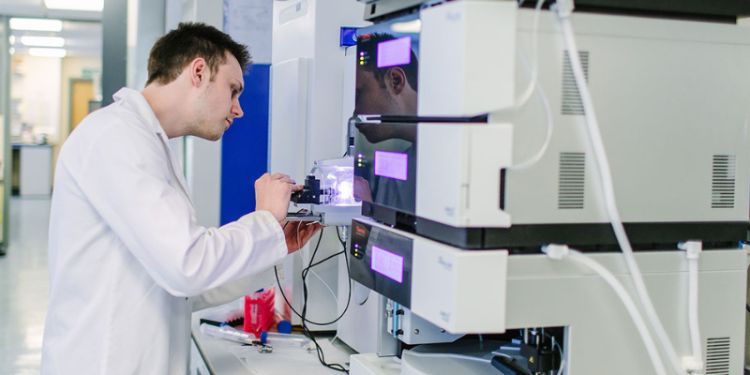New project launched to accelerate drug discovery

Researchers from the School of Molecular and Cellular Biology have joined a consortium of academics and industry partners as part of a new 9.7MЄ study.
The EU-funded project, Fragment-Screen, which is being led by Instruct-ERIC, aims to develop innovative tools that could help to advance new drugs using the approach of fragment-based drug discovery.
The project was born from the INFRA-2022-TECH-01 call held in 2022.
Fragment Based Drug Discovery (FBDD)
FBDD is a method used in the drug discovery process to identify compounds that could be used to target disease-relevant proteins. FBDD already has a proven track record of drug generation, with FDA approval given in several cases, such as for cancer treatment.
Up to now, NMR (nuclear magnetic resonance) and crystallography – methods which produce high resolution models of proteins - are used for the structural screening of millions of compounds. While these techniques have proven effective, they are time consuming and can have higher experimental cost.
Alternatively, FBDD, which is increasingly utilised both in the pharmaceutical industry and in academic settings, looks for small, incomplete molecules – also known as fragments- , that could bind to biological targets, and enables scientists to screen a wide chemical space with a low number (1000s) of compounds.
Taking the next step
The project will look to improve the tools used in FBDD, such as current bottlenecks in NMR, automation of data analysis (X-ray), and the general application of cryo-EM for high-throughput. It will also help make data analysis coherent over different methodological approaches.
A team of researchers within the Faculty of Biological Sciences, led by Professor Frank Sobott, will collaborate with the University of Lisbon, on a work package that will implement mass spectrometry - a tool to measure mass-to-charge ratio of molecules - for the first time to cross-validate findings.
Together with medicinal chemists, insight from the study will also provide input for the exploitation of artificial intelligence methodologies for drug development.
Working in partnership
The research infrastructures central to the project are:
-
Instruct-ERIC (Coordinator): Structural Biology
-
EU-OPENSCREEN ERIC: Chemical Biology
-
ELIXIR: Data Resources for Life Science
-
ESRF: European Synchrotron
-
European Molecular Biology Laboratory (EMBL)
-
Diamond Light Source
The project also includes industrial partners including:
-
Bruker Biospin GMBH
-
SIGNALS
-
ARINAX
-
Astex Therapeutics
-
ALPX SAS
-
FEI Electron Optics BV
-
IBM Research
Professor Frank Sobott, University of Leeds, said:
“For the first time, structural mass spectrometry approaches will be systematically investigated and applied in Fragment Based Drug Discovery. We’ll lead efforts, together with our partners at the University of Lisbon, to evaluate native and labelling approaches such as ion mobility and hydrogen-deuterium exchange for the validation of low-affinity binders to targets of pharmaceutical interest.”
Harald Schwalbe, Instruct-ERIC Director, said,
“I consider the Fragment-Screen project to transform fragment-based drug discovery. Within this, we could successfully bring together not only Structural Biologists and Medicinal Chemists, but also major European technology organisations, as well as companies in the rapidly growing field of Artificial Intelligence. At the end of the project, the process of drug development will be substantially improved.”




